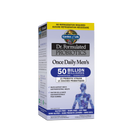Garden of Life Dr. Formulated Probiotics Once Daily Men's Shelf-Stable
If you're like many people, the idea of taking a daily probiotic supplement might sound like an oxymoron. After all, what good is a probiotic if you only take it once in a while? But Garden of Life brings us Dr. Formulated Probiotics, a daily probiotic formula packed with naturally occurring bacteria that actively work to maintain a healthy digestive system. The product contains a clinically proven 50 billion CFU dose of freeze-dried live Lactobacillus acidophilus and Bifidobacterium. It supports immune, digestive health and overall wellbeing. Shelf-stable Potency Promise is a probiotic that can be shipped without refrigeration to provide maximum potency.
Garden of Life Dr. Formulated Probiotics Once Daily Men's 50 Billion CFU is a shelf-stable probiotic that can be shipped without refrigeration to provide maximum potency.
Live cultures are essential for your probiotic, as they continue to grow and multiply as they populate your gut. Shipping them in a way that preserves their viability is crucial. A probiotic is a supplement that contains live bacteria that are meant to provide health benefits. This supplement uses 15 different strains of bacteria, including Lactobacilli and Bifidobacterial. This product is gluten-free and non-GMO verified.
Benefits:
- Supports digestive and immune system health
- 50 billion CFU
- Has a diverse probiotic blend
- No refrigeration required
- Non-GMO
- Dairy Free
- Gluten-Free
What is CFU?
"CFU," or colony-forming unit, is a measurement of a probiotic's effectiveness. CFU can be measured by taking samples from a probiotic culture and counting the number of living bacteria cells present in each capsule. The idea behind CFU is that if you want to know anything about the strength of the culture, it's best to look at how many viable cells are still left. In other words, CFU tells you how much bacteria is alive and kicking at any given time.
An essential concept of CFU is that you cannot simply multiply your final results by the number of colony-forming units per milliliter listed on the package. While doing so will give you a rough estimate, it does not take into consideration any growth lag time involved in the probiotic's growth.
What is a Probiotic?
Probiotics are "live microorganisms which, when administered in adequate amounts, confer a health benefit on the host." The significant health benefits of probiotics are well documented and include relief from diarrhea and irritable bowel syndrome. In addition to these beneficial impacts, probiotics are essential for brain development by reducing inflammation-induced anxiety behaviour. The human gut is a microbiome. It contains many different types of bacteria and other microbes, which keep us healthy by producing vitamins and destroying pathogens, and we're going to talk about both of these aspects.
One of the biggest myths about probiotics is that they help with weight loss. People think that you can get slim by taking probiotics and that they will help them lose weight. This myth is incorrect and not accurate.
A microbiome is the collective unit of life that lives in and on different parts of your body. This can include bacteria, viruses, fungi, protozoa, archaea, and other things in humans. The more you know about the human microbiota or, more specifically, your own microbial communities on our bodies, can be beneficial for knowing who you are as an individual.
Where is the Microbiome of the Human Body?
You may not realize it, but you carry a diverse and complex community of microbes on and in your body. The skin, mouth, nose and gastrointestinal tract are among the areas with species diversity of your microbiome. You can also find species within our mouth, nasal passage and even within the female genital tract. The microbiome is responsible for aiding in digestion and producing vitamins and immune responses in our bodies. Keep in mind that diversity is vital since not all species are beneficial for humans.
What Are the Possible Benefits of Understanding the Microbiome?
The microbiome has been linked to various health issues such as allergies, obesity, and even cancer. Some species could contribute to diseases such as obesity and diabetes and can be used as probiotics for fighting infections. By understanding the human microbiome, we can help design better treatments for many chronic illnesses and possibly prevent certain diseases from developing altogether.
Medicinal Ingredients (per capsule)
Men's Daily Probiotic Blend / 50 Billion CFU
Lactobacillus acidophilus (La-14) 15 Billion CFU
Lacticaseibacillus casei (Lc-11) 7 Billion CFU
Lactobacillus gasseri (Lg-36) 3.2 Billion CFU
Lactiplantibacillus plantarum (Lp-115) 3.2 Billion CFU
Lacticaseibacillus paracasei (Lpc-37) 3.2 Billion CFU
Levilactobacillus brevis (Lbr-35) 0.6 Billion CFU
Ligilactobacillus salivarius (Ls-33) 0.5 Billion CFU
Lacticaseibacillus rhamnosus (Lr-32) 0.3 Billion CFU
Lactobacillus delbrueckii subsp. bulgaricus (Lb-87) 0.1 Billion CFU
Limosilactobacillus fermentum (SBS-1) 0.1 Billion CFU
Bifidobacterium animalis subsp. lactis (Bl-04) 16 Billion CFU
Bifidobacterium breve (Bb-18) 0.5 Billion CFU
Bifidobacterium bifidum (Bb-06) 0.2 Billion CFU
Bifidobacterium longum subsp. infantis (Bi-26) 0.1 Billion CFU
Bifidobacterium longum subsp. longum (Bl-05) 0.1 Billion CFU
Non-Medicinal Ingredients (contains no carriers, artificial colours or flavours):
potato maltodextrin, acacia gum, silica, magnesium stearate (vegetable),
hypromellose (capsule). Ingredients used to maintain viability of probiotics
(dipotassium phosphate, monopotassium phosphate, trehalose, sucrose, sodium
ascorbate, dextrose, sodium chloride).
Suggested use:
Take one capsule once daily. It may be taken with food or without.
Caution:
If you are pregnant, breastfeeding or under a doctor's care, consult your physician before use.
This product is intended for adults and no children (unless supervised). If you are pregnant or nursing or under a doctor's care, consult your healthcare provider before use. Keep out of reach of children.










